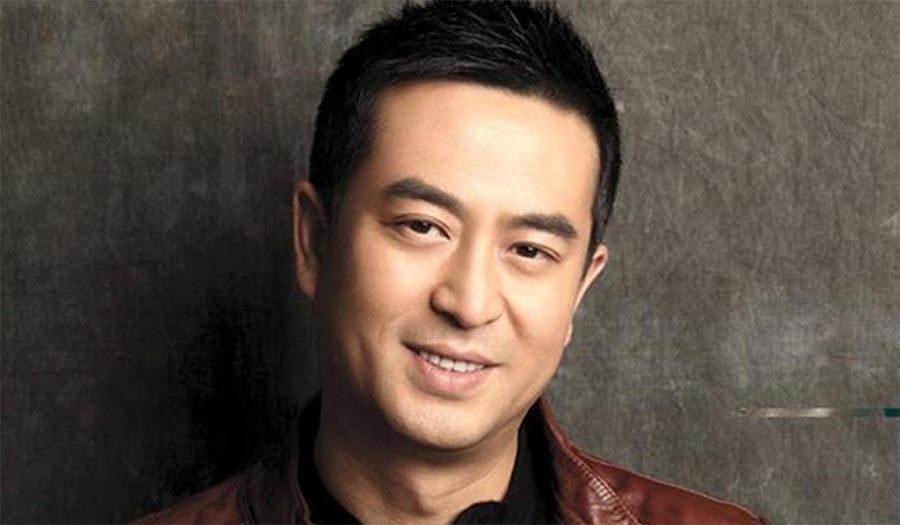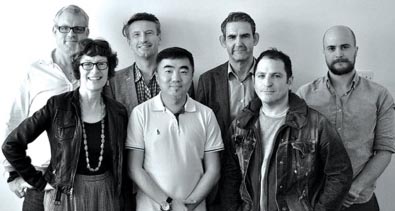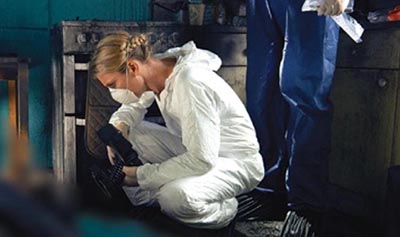| 中文|ENGLISH |
 |
| Rewriting the script for China |
|
China is hardly renowned for its highquality television drama, so how did a British team end up penning a 40part detective series for Chinese TV? Early last year, writing duo Dudi Appleton and Jim Keeble started getting some strange emails. They came from a TV producer in China, who said he had the financing in place for 40 hours of period drama and asked if they would they like to write it. The pair initially dismissed it as a joke. “We ignored it, we didn’t think it was serious,” says Appleton, one of the founders of 87 Films, the company behind Sky detective series Thorne, along with Keeble and producer Patrick Irwin. But then, as part of a trade mission to China, agent Tor Belfrage happened to meet the mysterious producer with
the big plans. He was Donghui Wang, who had just come off working with John Woo’s longtime collaborator Terence Chang on the acclaimed fi lm Brotherhood Of Blades. Belfrage dropped Irwin a line. “She said: ‘For God’s sake, would you get someone to answer this guy’s email? He’s for real,” Irwin recalls with a laugh. British writers Wang, from Beijingbased Combo Drive Pictures, wanted Keeble and Appleton to write a drama based on the Judge Dee series of historical mysteries, written by Dutch diplomat Robert Van Gulik in the ’50s and ’60s. Van Gulik found an 18th century, Chinese language novel whose detective was based on a 7th century magistrate of the Tang court, which inspired him to create a series whose title character became as renowned as Sherlock Holmes in modern Chinese culture. In contrast to Conan Doyle’s stories, Judge Dee has barely existed as a TV character outside of a shortlived Granada TV version in 1969 and four series of a Chinese version on CCTV from 2004 to 2010. Wang had bought the rights to the novels and the series would star Chinese actor Jiayi Zhang, Chinese TV’s biggest draw. While it would be filmed in Mandarin, from the outset Wang was convinced that the scripts needed to come from British writers. “The novels were written in English and the format of each story was very much like a modern detective story,” he says. “The reason I didn’t want to go to Chinese writers is they have a different way of telling stories for TV shows. In the main, Chinese TV is not yet of the quality of HBO or the UK. It still tends to be like a popcorn movie, which I’m not very interested in. With this book, it was a great opportunity to make something for Chinese TV and show that, actually, we are able to make something good. That’s why I wanted to work with Western writers.”
Judge Dee will be a major departure for Chinese television. Currently, sitcoms and potboilers predominate, released in huge tranches of 60 or 70 episodes. Sometimes several episodes are shown consecutively on a single night, every night of the week, allowing viewers to plough through a huge series in a matter of weeks. The economics of the industry are also very different. The entire production budget is raised privately, up front, and the entire run of 40 or more episodes is then scripted and shot. The producer takes the completed series to Chinese state broadcasters as well as the online broadcasters who, as in the West, are increasingly the major players. Hopefully, someone will want to buy it. Isn’t this a huge risk? “Now you understand why we didn’t believe it,” says Appleton. But Wang points out that having the country’s biggest TV star signed up to play one of the country’s bestloved characters was enough. Making 40 hours of television with no guarantee anyone will show it sounds like a gamble, but the rewards can be great: in recent years, every show starring Jiayi Zhang has been watched by more than 100 million viewers. The real risk may be cultural. What Wang is trying to do is bring a touch of TV’s muchtouted golden age to China. Hence his approach to 87 Films. Appleton and Keeble’s pedigree includes Silent Witness and Inspector George Gently and they are currently working for both AMC and HBO. They were identified for their potential to provide the type of complex, characterled stories that China lacks. Meanwhile, Patrick Irwin’s credits include The Fall and Jonathan Strange & Mr Norrell. Wang thinks he has the right men for the job – “I did quite a bit of research before I came to these guys,” he laughs. The Brits, for their part, saw Brother hood Of Blades. “It was incredibly good,” says Keeble. “It was character driven in a way that TV in China has not yet caught on to.” Silent Witness: Appleton and Keeble have written for the BBC1 crime drama; below: BBC1’s Christmas episode of Sherlock topped the box office in China Keeble and Appleton knew a little bit about what they were up against as well. Two years ago, they were judges on the International Emmys panel, and one of the regions they covered was China.
“Their shows didn’t really start with strong characters in the way that we would,” says Appleton. “Things have moved on. That’s where we saw what Donghui was trying to bring both to this project, and more generally to TV drama coming out of China.” Many British businesses have tried to crack the Chinese market without really understanding it, but this is the first time Western writers have been drafted in to create Chinese television, and it is an experiment that will be followed keenly by many others. “In a way, we’re blending two different systems,” says Keeble. “Chinese TV is about volume – not necessarily quality. It’s about a lot of episodes, storyoftheweek stuff. What we’re trying to do is a serialised, overarching story. We’ve had to carve that out of 36 novels into 40 hours of television, combining an HBOstyle system with the Chinese highvolume episodic system. It’s an incredible challenge.” When we meet, they have 20 complete scripts, produced using a Writers’ Room system featuring British scriptwriters such as Tom Farrelly and Andrew Clifford. The scripts were all written in the UK, translated into Mandarin and then sent to Wang for notes. Not only does he iron out cultural solecisms but he also knows how to appease the state censor, who they say is primarily concerned about historical accuracy. “There were certain conflicts that took place around the time of the novels, where we’ve got to be absolutely certain that we’ve been correct,” says Irwin. “You mustn’t suggest anything that might disrupt China’s relations with its neighbours now.” Pleasing the censor Wang says that to date the censor has hardly interfered, in part because the Dee stories are set nearly 1,500 years ago. “Our job has been to push it as far as we can,” says Appleton. “Donghui’s job is to say, ‘you’ve gone too far’ or ‘you can go further’. We decided that we would only write something that we would be happy about seeing ourselves. If we started in a patronising way, the whole thing would be nonsense.” Is there an audience in China for Westernstyle bluechip cable drama? Wang thinks there is, and his backers will be hoping he is right. In recent years, the rise of online broadcasters has exposed millions of Chinese to the BBC’s contemporary take on Sherlock – a cinema release of the recent Christmas special topped the country’s box office last month – plus ITV period drama Downton Abbey and US procedural CSI. The international idiom is now understood. “I don’t see those viewers having any problem watching these new types of show,” says Wang. Yes, he wants Judge Dee to be a hit in China, but his ambition stretches to proving to producers and financers around the world that China is capable of making worldclass television. He envisages a time when Chinese language shows are sold internationally, so that a series written by British writers and translated into Mandarin might wind up as a hit back in the UK. But that is for the future. Right now, Appleton and Keeble find themselves in the bizarre position of writing a show that, when finished, they won’t be able to understand. We will soon see if storytelling really is an international language.
|
Copyright © 2009 - 2017 CDP All Rights Reserved
网站制作:沈阳全景网络科技www.024360.com


